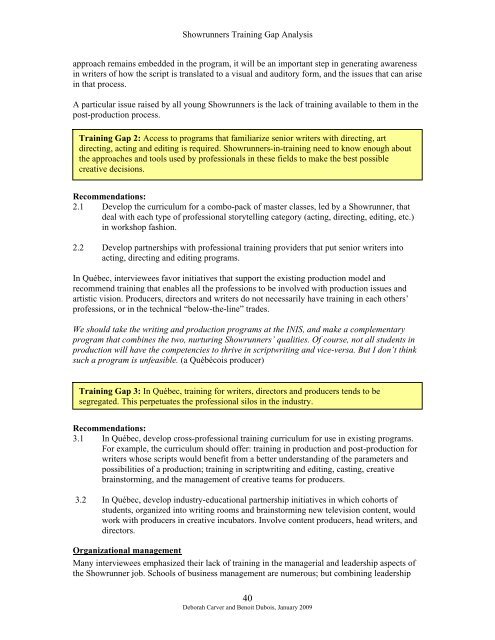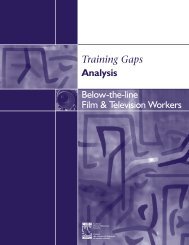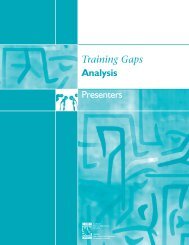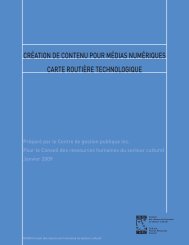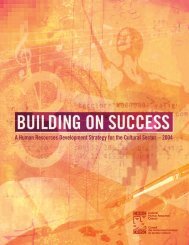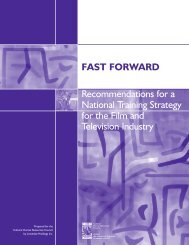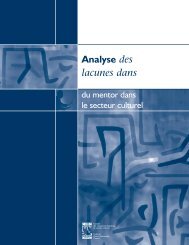Showrunners - Training Gaps Analysis - Cultural Human Resources ...
Showrunners - Training Gaps Analysis - Cultural Human Resources ...
Showrunners - Training Gaps Analysis - Cultural Human Resources ...
Create successful ePaper yourself
Turn your PDF publications into a flip-book with our unique Google optimized e-Paper software.
<strong>Showrunners</strong> <strong>Training</strong> Gap <strong>Analysis</strong><br />
approach remains embedded in the program, it will be an important step in generating awareness<br />
in writers of how the script is translated to a visual and auditory form, and the issues that can arise<br />
in that process.<br />
A particular issue raised by all young <strong>Showrunners</strong> is the lack of training available to them in the<br />
post-production process.<br />
<strong>Training</strong> Gap 2: Access to programs that familiarize senior writers with directing, art<br />
directing, acting and editing is required. <strong>Showrunners</strong>-in-training need to know enough about<br />
the approaches and tools used by professionals in these fields to make the best possible<br />
creative decisions.<br />
Recommendations:<br />
2.1 Develop the curriculum for a combo-pack of master classes, led by a Showrunner, that<br />
deal with each type of professional storytelling category (acting, directing, editing, etc.)<br />
in workshop fashion.<br />
2.2 Develop partnerships with professional training providers that put senior writers into<br />
acting, directing and editing programs.<br />
In Québec, interviewees favor initiatives that support the existing production model and<br />
recommend training that enables all the professions to be involved with production issues and<br />
artistic vision. Producers, directors and writers do not necessarily have training in each others’<br />
professions, or in the technical “below-the-line” trades.<br />
We should take the writing and production programs at the INIS, and make a complementary<br />
program that combines the two, nurturing <strong>Showrunners</strong>’ qualities. Of course, not all students in<br />
production will have the competencies to thrive in scriptwriting and vice-versa. But I don’t think<br />
such a program is unfeasible. (a Québécois producer)<br />
<strong>Training</strong> Gap 3: In Québec, training for writers, directors and producers tends to be<br />
segregated. This perpetuates the professional silos in the industry.<br />
Recommendations:<br />
3.1 In Québec, develop cross-professional training curriculum for use in existing programs.<br />
For example, the curriculum should offer: training in production and post-production for<br />
writers whose scripts would benefit from a better understanding of the parameters and<br />
possibilities of a production; training in scriptwriting and editing, casting, creative<br />
brainstorming, and the management of creative teams for producers.<br />
3.2 In Québec, develop industry-educational partnership initiatives in which cohorts of<br />
students, organized into writing rooms and brainstorming new television content, would<br />
work with producers in creative incubators. Involve content producers, head writers, and<br />
directors.<br />
Organizational management<br />
Many interviewees emphasized their lack of training in the managerial and leadership aspects of<br />
the Showrunner job. Schools of business management are numerous; but combining leadership<br />
40<br />
Deborah Carver and Benoit Dubois, January 2009


